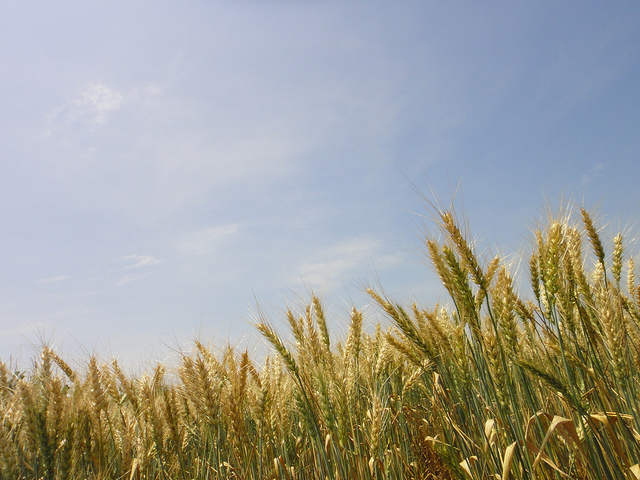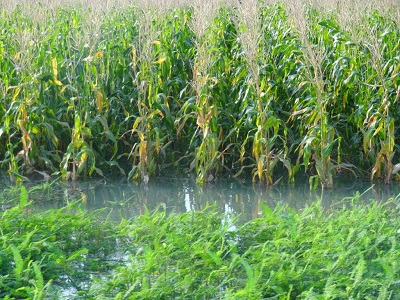Climate adaptation and mitigation
Climate change threatens to reduce global crop production, and poor people in tropical environments will be hit the hardest. More than 90% of CIMMYT’s work relates to climate change, helping farmers adapt to shocks while producing more food, and reduce emissions where possible. Innovations include new maize and wheat varieties that withstand drought, heat and pests; conservation agriculture; farming methods that save water and reduce the need for fertilizer; climate information services; and index-based insurance for farmers whose crops are damaged by bad weather. CIMMYT is an important contributor to the CGIAR Research Program on Climate Change, Agriculture and Food Security.
End of eight-year project leaves farmers ready to tackle climate change in Africa
 Climate adaptation and mitigation
Climate adaptation and mitigation
After eight years the Sustainable Intensification of Maize-Legume Cropping Systems for Food Security in Eastern and Southern Africa (SIMLESA) project concludes this June.
Scientists seek key to boost yields, ensure future food supply
 Climate adaptation and mitigation
Climate adaptation and mitigation
Crop genetic gains remain too low, and international scientists are making a concerted effort to determine how best to increase yields.
Science can reverse “new normal” of climate change-related disasters
 Climate adaptation and mitigation
Climate adaptation and mitigation
Emergency seed fuels quick farm recovery in drought-affected Ethiopia
 Climate adaptation and mitigation
Climate adaptation and mitigation
In response to Ethiopia’s worst drought in 50 years and a critical shortage of seed in 2016, CIMMYT and partners delivered over 3,400 tons of high quality seed to farmers.
Facing the fall armyworm threat
 Climate adaptation and mitigation
Climate adaptation and mitigation
In a new blog published by Farming First, B.M. Prasanna discusses overcoming a pest that has been ravaging fields in Africa.
Breaking Ground: Leonard Rusinamhodzi on innovating farming systems for climate change
 Climate adaptation and mitigation
Climate adaptation and mitigation
Leonard Rusinamhodzi works with African farmers to innovate farming systems in the face of climate change.
Establishing a soil borne pathogen research center in Turkey
 Climate adaptation and mitigation
Climate adaptation and mitigation
Turkey’s Ministry of Food, Agriculture and Livestock has for the first time allocated funding to establish a world-class center for research on soil borne pathogens.
New publications: How climate-smart is conservation agriculture?
 Climate adaptation and mitigation
Climate adaptation and mitigation
A new study shows that while CA is well suited to helping farmers adapt to, and even increase profits in changing climates, there is considerable uncertainty about how much CA contributes to the mitigation aspect.
Climate disasters are closing in. Why have we forgotten farmers?
 Climate adaptation and mitigation
Climate adaptation and mitigation
With fragile food systems at the mercy of the increasingly erratic weather, they stand to lose a lot more than those of us with the resilience to bounce back.
Better farmer access to machinery eases crop residue burning in India
 Climate adaptation and mitigation
Climate adaptation and mitigation
Farmers in India are benefitting from technological innovations that can help prevent damaging smog levels in the capital Delhi and other areas.
World leaders: Back climate change action in agriculture to give our food system a fighting chance
 Climate adaptation and mitigation
Climate adaptation and mitigation
Helping farming families thrive while fighting climate change in Mexico
 Climate adaptation and mitigation
Climate adaptation and mitigation
Women and youth help lead efforts to adopt climate-friendly farming and safeguard indigenous maize yields.
New Publications: Conservation agriculture increases the adaptive capacity of cropping systems
 Climate adaptation and mitigation
Climate adaptation and mitigation
A new study examined over 700 independent studies to find out if Conservation Agriculture works in a variety of environmental conditions in tropical areas.
Climate insurance for farmers: a shield that boosts innovation
 Climate adaptation and mitigation
Climate adaptation and mitigation
New insurance products geared towards smallholder farmers can help them recover their losses, and even encourage investment in climate-resilient innovations.


